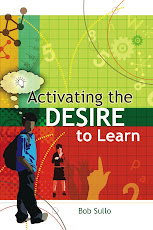As many schools across North America begin a new school
year, I found myself looking through some old memos I had shared with the staff
I led as a middle school administrator. Here’s an excerpt from one:
Did you know????
…..Healy, Epstein, and other scientists and developmental specialists
have found that in the early years, brain growth rates vary from as little as a
few months to as many as five years.
And there are definite differences in how the female and male brains
develop (Eric Jensen, Brain-Based
Learning & Teaching, 1995, Turning
Point Publishing, p.87).
Too often (for me), I
attend meetings where parents are informed that their child has not learned
something they “should” know by now.
Each time I hear that, I cringe.
Given the wide variation in normal brain development, it simply doesn’t
make sense to say a child “should” know something simply because she or he
happens to be in a particular grade. Cognitive growth and development is as
varied as physical growth and development. All we have to do is look around our
school to see that “typical” kids develop at different rates. (Those of us who
are parents can sometimes see the differences in our own children.)
I reject the belief that kids “should” know certain things
just because they are in a certain grade, especially in a public school serving
the general population. Instead, it’s more accurate to tell parents that “most
kids have mastered” certain things at this point or “your child is having more
difficulty with this than many of the other students” or “most of the other kids
are able to do this by now.” Those statements are true, provide accurate
information to parents, and do not distort the truth.
To say kids “should” know such and such flies in the face of
research and invites feelings of inadequacy and guilt on the part of parents. I
aspire to simply tell the truth and stop “shoulding” on others.
As always, if you enjoyed this and found it useful, please
send the link to your friends. Thanks.
Bob Sullo
PO Box 1336
Sandwich, MA 02563
For information about books by Bob Sullo and to schedule a
keynote, workshop, or series for your school, agency, or parent group visit
www.internalmotivation.net






No comments:
Post a Comment